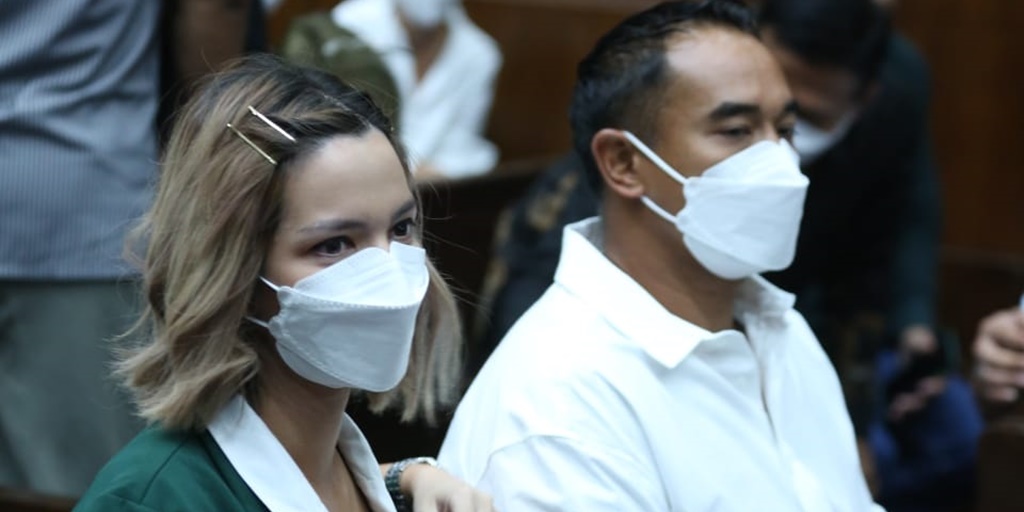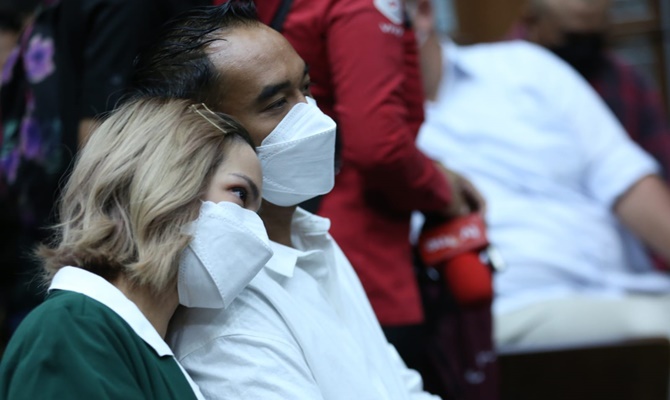61-Second Sex Video Similar to Nagita Slavina Circulating, Raffi Ahmad Goes Crazy: Insane!
Want to know Raffi Ahmad's reaction when he heard about a 61-second sex video that went viral because it resembled Nagita Slavina? Find out here!

Kapanlagi.com - Former Chief of the Indonesian National Police Criminal Investigation Department, Commissioner General (Ret.) Anang Iskandar spoke out about the one-year prison sentence for Nia Ramadhani and Ardi Bakrie in relation to a drug abuse case.
According to Anang, the verdict is not appropriate and they should not be imprisoned but rehabilitated instead.
“If there is a narcotics law, it needs to be understood by everyone, including judges throughout Indonesia. The punishment for defendants proven to be drug abusers is rehabilitation, not imprisonment. That's what the narcotics law says,” said Anang when contacted on Thursday, January 13, 2022.
Anang explained, in the judge's decision it was stated that Ardi and Nia were not victims of drug abuse in the sense of being persuaded, seduced, or deceived into using drugs.
"But Nia is not a victim, but an abuser in a state of dependency. The punishment is rehabilitation," explained Anang.
Anang, who is also a former Head of the National Narcotics Agency (BNN), added that all judges should learn about the Law and narcotics laws first.
He said that judges, in performing their duties, should not be guided by the purpose of the narcotics law and causing suffering to the society. Instead, they should sentence rehabilitation, but the fact that they sentence imprisonment like what Nia and others experienced, such judges should receive guidance to fully understand the narcotics law.
"If I were the Chief Justice, I would educate all judges in Indonesia to understand the spirit of the narcotics law," he added.

© KapanLagi.com/Budy Santoso
Furthermore, Anang explained, juridically, in examining cases of drug abuse, the judge is obliged (Article 127/2) to decide or determine the defendant like Nia to undergo rehabilitation as a form of punishment (Article 103), by first considering the dependency level of the defendant (Article 54) and the elements that can invalidate the criminal act committed by Nia and others (Article 55).
"If Nia and others report themselves as drug addicts to IPWL, then their criminal status will not be prosecuted, whereas if Nia and others initially used drugs because they were persuaded, deceived, or even forced to use drugs, they are called victims of drug abuse. If Nia and others repeatedly use drugs, they are called addicts. Juridically, both victims of drug abuse and addicts are obliged to undergo rehabilitation (Article 54)," explained Anang.
The Police General said that these three additions, judges have the freedom and confidence to impose punishment, but in examining drug abuse cases, judges cannot hide behind the name of freedom and confidence because the purpose of the law clearly states that in eradicating drug trafficking, and the law guarantees that drug abusers receive medical and social rehabilitation efforts.
Therefore, law enforcement officers in examining drug cases have the duty to ensure that drug abusers receive medical and social rehabilitation efforts.
Specifically for judges, they are given the obligation (Article 127/2) in examining drug abuse cases like what Nia and her colleagues experienced, to pay attention to the use of authority based on Article 103/1, which is the authority to impose rehabilitation punishment in accordance with the purpose of the narcotics law.
"If the panel of judges at the Central Jakarta District Court clearly does not pay attention to the purpose and mission of law enforcement as well as the obligations and authority given by Law No. 35 of 2009 concerning narcotics, and instead sentences imprisonment to drug abusers like Nia and her colleagues; then, what does the Supreme Court do? Does the Supreme Court remain silent or does the Supreme Court actually endorse drug abusers being sentenced to prison? Drug abuse cases are sentenced to prison, not appeal cases but cases of misuse in the use of punishment. The prosecutor demands rehabilitation, the judge imprisons," he said.
(kpl/bus/nda)
Cobain For You Page (FYP) Yang kamu suka ada di sini,
lihat isinya
Want to know Raffi Ahmad's reaction when he heard about a 61-second sex video that went viral because it resembled Nagita Slavina? Find out here!
After a vacation, Bunga Zainal and her family are quarantining in a hotel in Jakarta. In fact, Bunga Zainal was seen cleaning her hotel room. Curious about how Bunga Zainal looks while cleaning the hotel room? Let's check it out, KLovers.
MAX CHANGMIN releases a new mini album and the MV for 'DEVIL'.
Long unheard of, it turns out Cindy AFI has been living in the Netherlands with her husband and child. Curious about the latest photos and news of Cindy AFI who is now far from the spotlight?
2021 has been the toughest year for Michael Yukinobu De Fretes or Nobu. As known, he got involved in a 19-second explicit video case with Gisella Anastasia.
During the examination, Ardhito Pramono has been using marijuana since 2011
MAX CHANGMIN's comeback, his eternal youthful charm successfully distracts!
The police confirm that Jeanneta Sanfadelia is Ardhito Pramono's wife. What did they say?
Ardhito Pramono has been designated as a suspect in a drug case.
It is known that Via Vallen gave a gift in the form of a sultan guitar to her father on his birthday. Curious about the portraits of Via Vallen celebrating her father's birthday in luxury? Let's check it out KLovers.
Curious about the closeness between Wulan Guritno and her two daughters, Shaloom and London, on various occasions? Let's check it out, KLovers.
Taqy Malik auctions off his luxury watch to build a mosque in Yogyakarta.